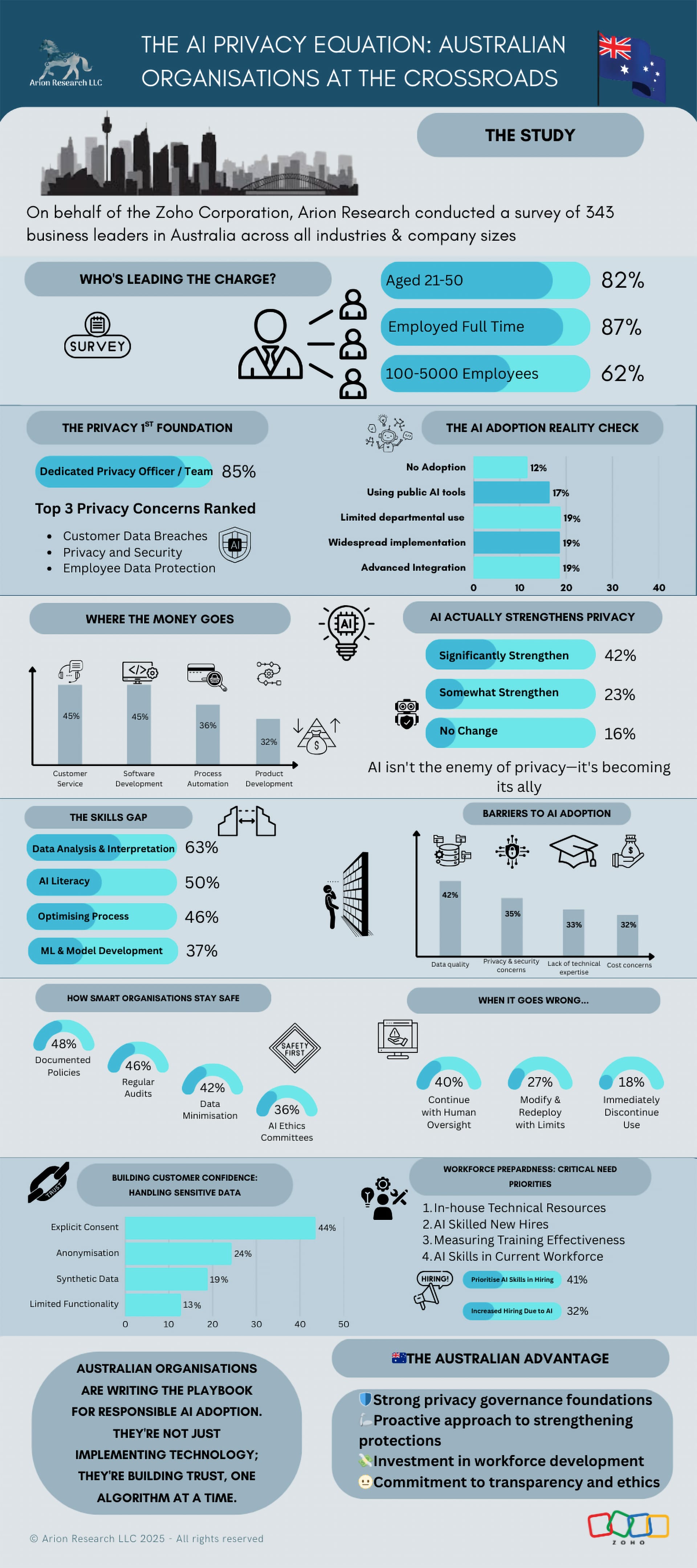AI adoption strengthens privacy practices in Australia despite persistent data challenges
Zoho’s new report shows AI adoption is boosting data privacy for 65% of Australian firms while revealing key skills and data quality challenges.

A new report by Zoho Corporation has found that artificial intelligence (AI) adoption is helping strengthen data privacy practices across Australian organisations. Contrary to concerns about AI threatening personal information, 65% of the 350 organisations surveyed said AI has improved their privacy frameworks. The findings reflect a strong national push to safeguard sensitive data while adopting emerging technologies responsibly.
The research, titled “The AI Privacy Equation: Australian Organisations at the Crossroads,” shows that local businesses are embedding privacy measures to build trust and mitigate risk. Nearly half of respondents have introduced formal privacy policies and regular audits, while 85% employ a dedicated privacy officer. Human oversight remains a priority, with 40% actively monitoring AI systems when problems occur. On the customer side, 44% of businesses said they seek explicit consent when handling sensitive data to improve transparency and trust.
Rakesh Prabhakar, Head of Zoho Australia and New Zealand, said: “AI and privacy are often seen as opposites, but our research shows a different reality inside Australian organisations. When businesses ‘AI up’, they’re forced to ‘privacy up’ – it’s an operational necessity, not altruism. Yet this progress often remains invisible to customers, creating a gap between perception and organisational reality. As reforms progress, compliance will only become stricter, making early investment in privacy a competitive advantage.”
Australia leads in global privacy investment but faces skill gaps
Australia is emerging as a global leader in privacy investment, with 82% of organisations increasing spending in this area, outpacing the global average of 78% and the US at 72%. This momentum is partly driven by strict regulations such as the Privacy Act and a cultural emphasis on protecting personal data. Customer data breaches remain the top concern for 35% of Australian organisations.
However, a significant perception gap persists. Despite robust internal governance, fewer than half of businesses feel confident explaining how AI uses data to customers, which continues to fuel public concerns. Michael Fauscette, Founder and CEO of Arion Research, said: “There’s a widely held perception that AI threatens privacy, but studies like this show the opposite. When deployed responsibly, AI can reinforce trust and compliance. Surveying business leaders provides local insights into on-ground practices, demystifying perceptions of AI’s impact on privacy.”
Other key hurdles remain. Poor data quality is the most cited barrier to AI adoption, reported by 42% of organisations. Skill shortages are also acute, with 63% lacking data analysis expertise and more than half identifying AI literacy as a workforce gap. Additionally, 29% said they do not fully understand the privacy implications of their AI systems.
Prabhakar noted that the next 12 to 18 months will be critical: “Australia has the right foundations. The next phase will be about shifting from reactive compliance to privacy-by-design. Organisations that make this transition will gain a competitive advantage, while those that delay risk regulatory and reputational damage.”
AI investment linked to workforce growth and evolving job roles
The report also found that Australian businesses are directing significant AI investment into customer service and software development, with both areas cited by 45% of respondents. These are seen as having a direct impact on customer experience and operational efficiency.
Concerns that AI will cause widespread job losses are not fully supported by the data. Almost a third of Australian organisations reported increasing hiring because of AI adoption, while 41% said AI-related skills will be a priority in future recruitment. The findings suggest the key challenge is not job displacement but equipping the workforce with the capabilities to manage and scale AI responsibly.
The report reinforces that while Australia is taking global leadership in privacy and AI adoption, bridging the skills gap and improving public understanding of AI’s role in data protection remain essential for sustainable progress.















